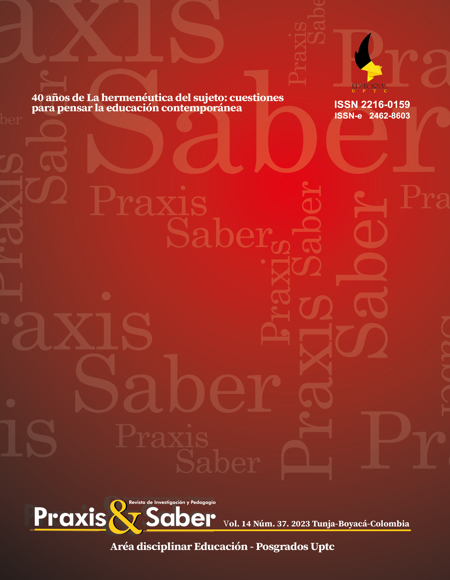Virtualizations of Foucauldian research on the care of the self: : the human in check

Abstract
This article aims to propose a horizon of virtualization of Foucauldian research on the care of the self in classical Antiquity, through the interpellation of the figure of Anthropos as an operator of our current modes of thought. To this end, the work initially articulates the discussions present in the course The hermeneutics of the subject, taught in 1982 at the Collège de France, with regard to issues related to the man/human form; these are raised by the confrontation of two historical documents of an anthropological-ethnographic nature: Argonauts of the Western Pacific, in 1922, by Bronislaw Malinowski, and In the Eye of the Wild, in 2019, by Nastassja Martin. The study points to the ethical implictions of this discussion both in the philosophical and the educational-philosophical fields, by focusing on the limits of transcendental categorizations that set the boundaries between humans and non-humans. Such implications force educational actuality towards the gesture of refusal of the subject, manifested in the form of man/human, as an universal, calling on education to pay attention to the forces of life itself in its continuous variations.
Keywords
philosophical education, anthropology, cultures, ethics, educational objectives
Author Biography
Cintya Regina Ribeiro
Research professor at the Faculty of Education at the University of São Paulo. Doctor and Master in Education from the same institution, with a doctorate in Human and Social Sciences from the University of Buenos Aires. She develops research on Deleuzo-Guattarian and Foucaultian thought articulated in art and in the educational field.
References
- Foucault, M. (1999a). As palavras e as coisas. Martins Fontes.
- Foucault, M. (1999b). Problematização do sujeito: psicologia, psiquiatria, psicanálise. Forense Universitária.
- Foucault, M. (2001). Estética: literatura e pintura, música e cinema. Forense Universitária.
- Foucault, M. (2004a). A hermenêutica do sujeito. Martins Fontes.
- Foucault, M. (2004b). Ética, sexualidade, política. Forense Universitária.
- Foucault, M. (2005). Arqueologia das ciências e história dos sistemas de pensamento. Forense Universitária.
- Foucault, M. (2010). Repensar a política. Forense Universitária.
- Foucault, M. (2011). Arte, epistemologia, filosofia e história da medicina. Forense Universitária.
- Foucault, M. (2014). Genealogia da ética, subjetividade e sexualidade. Forense Universitária.
- Foucault, M. (2016). Subjetividade e verdade. WMF Martins Fontes.
- Gros, F. (2004). Situação do curso. Em M. Foucault, A hermenêutica do sujeito (pp. 613-661). Martins Fontes.
- Gros, F. (2008). O cuidado de si em Michel Foucault. Em M. Rago & A. Veiga-Neto (Orgs.), Figuras de Foucault (pp. 127-138). Autêntica.
- Gros, F. (2012). A propósito de A hermenêutica do sujeito. Mnemosine, 8(2), 316-330. https://www.e-publicacoes.uerj.br/index.php/mnemosine/article/view/41569/28838
- Gros, F. (2016). Situação do curso. Em M. Foucault, Subjetividade e verdade (pp. 273-288). WMF Martins Fontes.
- Malinowsky, B. (1978). Argonautas do Pacífico Ocidental (2ª ed.). Abril Cultural.
- Martin, N. (2021). Escute as feras. Editora 34.
- Muchail, S. (2011). Foucault, mestre do cuidado. Loyola.
